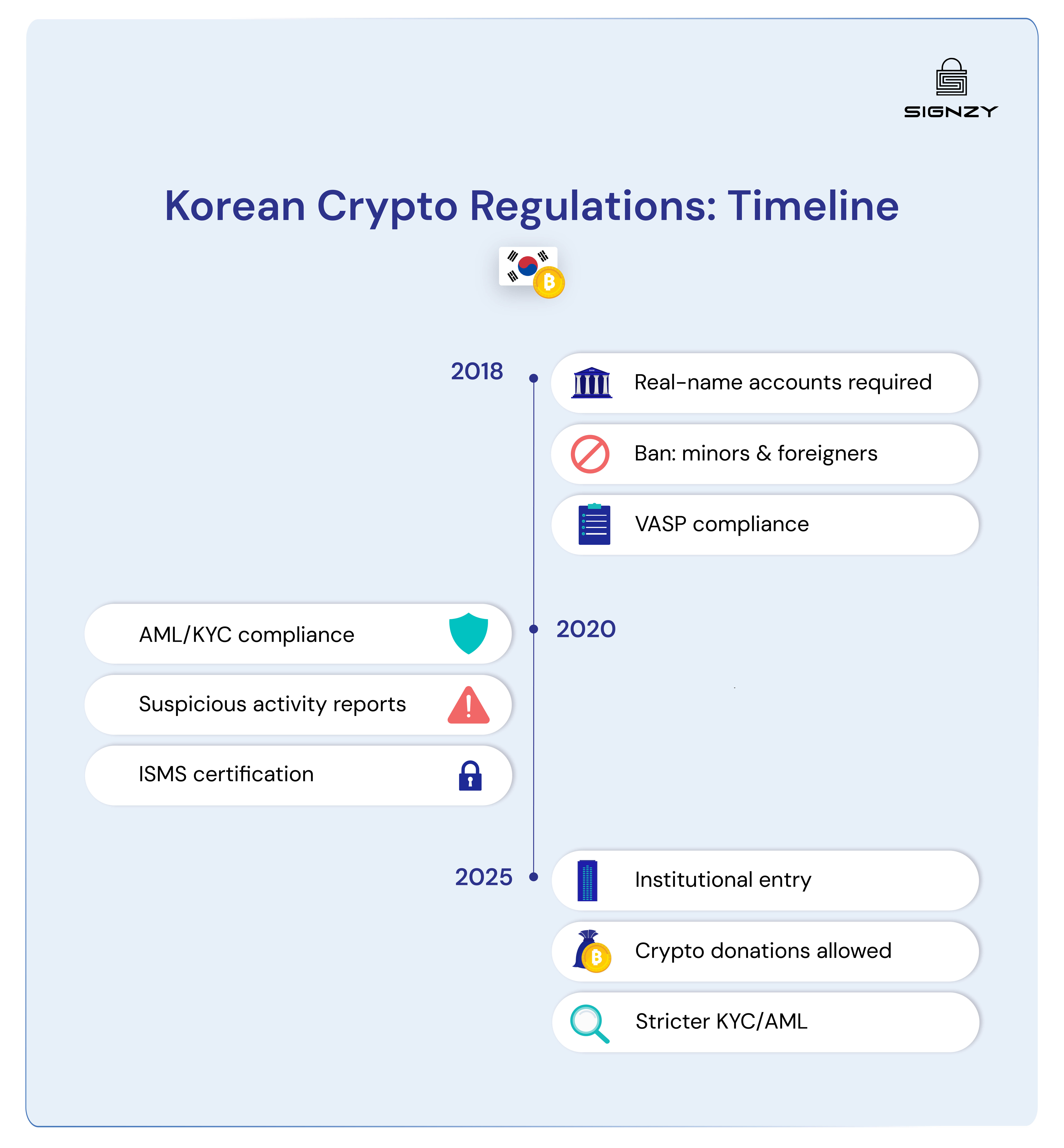Korean Crypto Market 2025: New FSC Rules Invite Banks, Charities and Corporates
Since the start of 2025, the Korean crypto market has been making headlines. Before we dive deep into that, let us take a look at why crypto is so vital and popular.
Crypto is like that popular kid in school who is in the news every other week. The reason behind it making it to the headlines varies from country to country, yet it holds that significance. It is powerful and influential enough to move most world economies and why not?
Before we dive deep into why we are today talking about that popular kid, let us see the numbers it brings to the table.
In 2025, the global cryptocurrency market is expected to generate US$45.3 billion in revenue. Yes!US$45.3 billion. If these numbers are not amusing enough, we have more in store to make you awestruck. There are over560 million crypto users across the world, which is close to 6.8% of the global population. These facts are glaring!
It is pretty much given that crypto is here to stay in the long run. However, not all countries have embraced this digital revolution equally. Asia leads the pack in ownership, followed by North America. Among the top crypto-adopting countries are the United Kingdom, Brazil, the United States, Germany, and, notably, South Korea.
However, not all countries have accepted this new normal called crypto. Talking about regions, North America comes in second to Asia in terms of cryptocurrency ownership. And getting into the specific country-wise data, these are thecountries topping the charts: the United Kingdom, Brazil, the United States, Germany, and South Korea.
Now, we turn our focus to South Korea and its dynamic crypto ecosystem.
South Korea and Its Crypto World
The Korean government has given legal status to cryptocurrencies. They are permitted to be traded on exchanges designed solely for these currencies. However, the government has kept a very tight rein on it. These exchanges are mandated to abide by additional and more stringent regulations. The purpose of these rules is to safeguard investors and maintain the stability of the financial system.
And so, given these humongous efforts by the Korean government, the crypto world there is very well accepted by the investors and why do we say that?
According to the most recent data from the FSC,9.7 million South Koreans used cryptocurrency exchanges as of the end of last year, representing almost 20% of the country’s entire population. And the number of crypto users is expected to reach a high of12.41 million by 2025. The penetration rate is expected to be around24.01%, which indeed is huge.
So, it is safe to say that Korea and the crypto world have supremely amicable ties. But there is an obvious but. Due to South Korea’s stringent cryptocurrency laws, trade volume has decreased and platforms are moving toward ones that are safer and more regulated.
Key Korean Crypto Regulations

The Korean regulations are crafted keeping the idea of protecting the investor’s interest and prevention of illegal activities, and primarily crime prevention, at the core. The Financial Supervisory Service of South Korea (FSS) oversees government registration and other processes. Recently, there have been a few amendments brought in this arena.
We bring to you a brief time-lapse as to how the regulations around cryptocurrencies have been shaped over the years.
Year 2018:
It was then that the regulators started to control cryptocurrency trading by limiting it to real-name bank accounts. To put it briefly, in order to trade cryptocurrencies, a trader needed to have a bank account.
The Korean government was aware that the crypto world could be the entry point for terrorists and other illegal activities, and so it was determined to formulate laws curbing it.
The above measure was taken keeping in mind the same ideology. This was done so that banks could confirm the trader’s identity and prevent money laundering and criminal activity. Minors and foreigners were banned from crypto trading.
Up until then, only the four biggest Korean exchanges—Bithumb, Upbit, Coinone, and Korbit—had implemented the regulations. Now, all Korean Virtual Asset Service Providers (VASPs) were, nevertheless, mandated to adhere to the crypto regulations.
Year 2020:
Then came a game-changing moment:
In March 2020, the following key Korean crypto regulations were announced that changed the game on the ground:
- Verification of actual name: In accordance with the 2018 rules, open an authorized bank account and give clients access to real-name bank accounts maintained at the same institution.
- Compliance with anti-money laundering (AML) regulations: All crypto service providers must update their AML/KYC procedures and register with Korean financial regulators prior to starting their business after the new cryptocurrency legislation goes into effect. Exchanges must follow AML regulations by carrying out comprehensive KYC checks.
- Requirements for reporting: Exchanges are required to notify the Korean Financial Intelligence Unit (KoFIU) of any suspicious activity.
- Security Certification: Obtain a certification from the Korea Internet Security Agency (“KISA”) for an Information Security Management System (ISMS)
Year 2025:
In February 2025, the Financial Services Commission (FSC) made bold announcements signalling a shift toward institutional adoption.
Entry Pass for Institutions:
- Previously, institutions were banned from opening any crypto exchange accounts.
- But now, starting in the second quarter of 2025, nonprofit organisations such as charities and universities can open real-name verified accounts on crypto exchanges.
- By the third quarter of 2025, a pilot program will allow ~3,500 corporations and professional investors to trade on crypto platforms—a historic first.
Donation Monetization:
- From June 2025, nonprofits and certain registered exchanges will be allowed to sell their crypto donations.
- Exchanges can now liquidate user fees paid in crypto, a move towards operational flexibility.
Stricter KYC & AML Oversight:
- The FSC is pushing banks and exchanges to enhance their Know Your Customer (KYC) procedures, particularly for institutional clients.
- In the second half of the year 2025, new proposals will mandate that public companies and professional investors adhere to enhanced AML obligations when trading crypto.
- Institutions must monitor transactions for potential money laundering threats, in line with FSC’s tightened oversight goals.
Conclusion
The value of popular cryptocurrencies, including Dogecoin, Ethereum, and Bitcoin, has fluctuated over the current era of instability in the cryptocurrency market. The number of altcoins, or alternative cryptocurrencies, with distinctive characteristics and applications, has also increased in the market.
The market for cryptocurrencies is expanding due to a number of factors, such as the growing acceptance and adoption of cryptocurrencies by both individuals and institutions, the growing interest in decentralized finance (DeFi) platforms, and the potential of cryptocurrencies as a hedge against political instability and inflation.
In the upcoming years, the cryptocurrency market is anticipated to keep expanding. This expansion is anticipated to be fueled by the growing use of cryptocurrencies by both individuals and organizations, as well as the continuous advancement of DeFi and other blockchain-based systems. As is common with any new and quickly changing market, the market is also likely to see volatility and corrections.
We, at Signzy, comprehend the need of the hour. Our product and compliance teams work alongside to design tools which can be a perfect fit.
We are referring to our KYC and AML solutions, which certainly will be your best friend in this compliance journey if you are already a part of the Korean crypto world or planning to enter this charismatic world.
To learn more about us and our services, visit us at https://www.signzy.com/.

Payal Gajiwala
Payal is a specialized corporate law specialist , with a strong foundation built through prior roles at Mahindra & Mahindra and the Tata Group. With over 7 years of experience navigating corporate law, governance, and regulatory frameworks, she brings a sharp legal lens to every task. Outside boardrooms and compliance checklists, Payal channels her passion for writing into translating complex legal and regulatory themes into clear, thoughtful narratives


